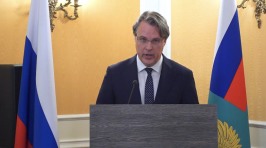Excellencies,
Honourable Ladies and Gentlemen!
It’s a pleasure to welcome you all to our reception today. We have timed it to the opening of the 78th session of the United Nations General Assembly. We are certain that in the current realities our co-operation within the framework of the Group of Friends in Defense of the UN Charter, established on the initiative of Venezuela, is more necessary than ever. It is important to step it up beyond New York, including here in Brussels. For our part, we reiterate our readiness to contribute in every possible way to the further revitalisation of the activities of the Group and its expansion. We are convinced that raising the profile of this format in the information space here in Brussels will contribute to the realisation of the common goals and objectives that unite us within this Group. Our joint press releases constitute one of the elements of this work.
We all happen to live in a challenging era. As the President of the Russian Federation, Vladimir Putin, has said: “We are facing the most dangerous, unpredictable but at the same time most important decade since the end of World War II”. The period of unlimited dominance of the West in global affairs is coming to an end. The unipolar world, built on the financial and technological monopoly of Western countries and neo-colonial in its essence, is becoming a matter of the past. A new world order is emerging, based, no matter how much the West tries to deny this, on multipolarity, diversity of civilisational patterns and cultures, genuine mutual respect and equality. The new system of international relations implies a balance of powers and interests between states, geopolitical macro-regions and regional organisations. Undoubtedly, non-Western players that have a significant role in global politics and economy and objectively need to preserve their sovereignty, unique cultural code and identity, hold the potential to become independent centres of this emerging multipolarity. Taking into account the whole range of contemporary realities, the Concept of Foreign Policy of the Russian Federation was updated in March this year. It envisages a differentiated approach to building relations with states and international organisations depending on their policies towards our country.
Naturally, the West is doing its utmost to maintain its global hegemony, including through the imposition of certain "rules" to which no one has signed up, but on which the world order is allegedly supposed to be based. This is a world order where someone's parochial interests are presented as universal, where sanctions are used indiscriminately and without any respect for international law, where all dissent and alternative points of view are suppressed, where the problems of ensuring human rights and the fair provision of humanitarian assistance to those in need are turned inside out and become objects of political bargaining. As a result of such policies, we are witnessing numerous cases of the Western "double standards". One of the most unacceptable examples for us is when the European Union pretends to advocate respect for the rights of national minorities, while in reality it covers up Kyiv in its policy of discrimination against the Russian and Russian-speaking population of Ukraine.
Such Western actions have nothing to do with the principles enshrined in the Charter of the UN as an organisation designed to ensure multilateralism and co-ordination of world politics. This is why the work of the Group of Friends in Defense of the UN Charter has assumed truly global significance.
Today, the question of the future of international relations is more pressing than ever: through the establishment of a sustainable consensus based on a balance of interests or through the aggressive and explosive promotion of hegemony. The same applies to the "Ukrainian issue", which cannot be considered separately from the geopolitical context. The situation in and around Ukraine constitutes just one element of attempts by a small group of Western states to reverse the objective processes of forming a multipolar architecture of international relations. The unprecedented unilateral restrictive measures against Russia and the choice in favor of confrontation with our country are in line with the West's desire to "cling" to its monopoly in world processes at any cost.
As a matter of fact, the European Union's reliance on the so-called "peace formula" and its public denial of any other proposals put forward by other international players also fits into this Western logic. Meanwhile, this Ukrainian "plan" is not only unable to seek a negotiated diplomatic solution to the crisis, but represents a senseless ultimatum to Russia, on the basis of which a peaceful settlement is impossible.
In contrast, we welcome the initiatives of countries seeking to resolve any current issues through honest collective work aimed at striking a balance of interests on the basis of the sovereign equality of States and the indivisibility of security. We will continue to promote fruitful cooperation with them for the sake of improving the situation in the world and building inter-State dialogue on the principles of genuine multilateralism, international law, truth and justice.
Thank you for your attention.























